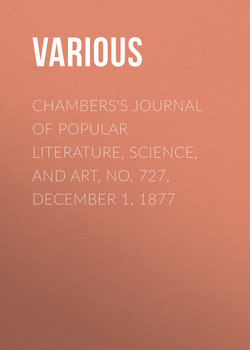Читать книгу Chambers's Journal of Popular Literature, Science, and Art, No. 727, December 1, 1877 - Various - Страница 2
A CAST OF THE NET
THE STORY OF A DETECTIVE OFFICER
ОглавлениеIN FOUR CHAPTERS. – CHAPTER I
Any one who feels the slightest curiosity as to the date of my story, can tell pretty nearly when its events occurred, by various incidents mentioned in it, and which the public know quite as much about as I do; but I do not feel inclined, for certain reasons of my own, to identify the precise date or to name the exact spot at which I was employed in the business.
It was a case for the police – for the detective police – and I was the detective employed. Now you must understand that I was not at this time regarded as a regular detective; I was a sergeant in what we will call the 'A' division, and I did ordinary duty; but though I was not yet on the regular detective staff, somehow or another I was very often taken from my usual work and put on all sorts of jobs, sometimes fifty or a hundred miles in the country; and I was once paid a very high compliment by the chief magistrate – of course I mean at Bow Street. He said: 'Nickham, you're not a regular detective, are you?'
'No, your Worship,' I said; 'I am not.'
'Well, Nickham, you're worth a dozen of them; and I have made a special note of your conduct, and shall send it on to the Commissioner.'
The Commissioner was old Sir Richard Mayne then. And that's how I got to be a sergeant; but it was only because I was lucky in two or three cases which the chief magistrate happened to notice.
Well, I was one night at the section-house, for I wasn't on duty (I don't mean the station-house; the section-house is a place where our men lodge, perhaps fifteen or twenty together, or more); and I was sitting in the large room by myself; for it was a fine evening, and none of the men cared much about chess or draughts or things of that kind. I was reading the paper by myself, when the door opened and one of our people looked in. It was Inspector Maffery; and I was very much surprised to see him there, as our place was quite out of his district. Seeing I was by myself, he said: 'Oh!' in a tone which shewed he was pleased at it, and turning to some one outside, he said: 'Come in, sir; the party is here by himself.' With this, a tall, stout, gray-whiskered gentleman came in.
Inspector Maffery closed the door after him, and not only did that, but shot the bolt, and then coming to me at the table, says: 'Nickham, this is Mr Byrle, the celebrated engineer that you have heard of.'
Of course I had heard of him; in fact I once had a cousin who worked in his factory. So I bowed and made a civil remark.
Then Inspector Maffery went on to say: 'This, Mr Byrle, is Sergeant Nickham, one of our most active men, as I have told you, and who, I think, is just the man for you. This place is very safe; and as I have bolted the door, and the men below know I am here, there will be no interruption; and you can say anything you wish to Nickham as well here as anywhere.'
So they sat down; and with a very polite speech, for he was really a gentleman, Mr Byrle told me what he wanted.
He made a long story of it; I shall not; but the public have really no idea of putting facts well together, and presenting them without any excrescences, if I may say so. However, I listened patiently, and found out what was required. It seemed that his factory had been robbed on several nights, in spite of an extra watchman being put on; and only the completely finished and most expensive engine-fittings were taken; shewing that the thief, whoever he was, knew what things to take, where to find them, and where to dispose of them. The robberies were mortifying, because they proved, as all such things do, that the firm were employing a thief, and trusting some one who was deceiving them. The loss of these fittings often delayed other work seriously; and above all, it was considered that it demoralised all the factory (where best part of a thousand hands were employed), by shewing that the firm could be robbed with impunity. So, although it was hardly the sort of business which a first-rate man was required to work; and though I say it myself, and though spite and envy in certain quarters kept me off the regular staff, there was not a better man in London than I was, and our people knew it; yet I listened very patiently, and asked such questions as occurred to me. For a civilian, Mr Byrle seemed pretty sharp at catching my drift; while as an old hand, and knowing what was best with the public, Inspector Maffery sat without saying a word, or one now and again at the most, leaving Mr Byrle to settle things for himself. I then roughly sketched out a scheme, which in a few words I laid before the gentleman.
